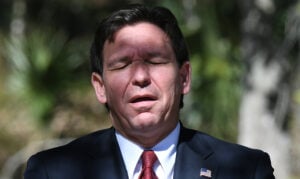[ad_1]

(Photo by Paul Hennessy/SOPA Images/LightRocket via Getty Images)
Poor Ron DeSantis thought he could waltz into the White House by using the state of Florida as a laboratory of Tucker Carlson fever dreams. Don’t believe in COVID? He picked a fight with the cruise lines and… got smacked around in court. Mad at those progressive prosecutors? He tried to fire locally elected prosecutors and… got laughed out of court. Pissed off at Disney for believing gay people have rights? He messed with the Mouse and… learned that Disney has better lawyers than he does.
All of these moves were doomed from jump, but it didn’t matter because Florida taxpayers could foot the bill for fighting these legal battles as long as Ron could position himself as standing tall (perhaps with some generous heels) against some hazy sense of “wokeness” so he could blitz through the GOP primaries.
Instead “Rob DeSanctimonious,” as Donald Trump doubly misnamed him, only earned himself a string of brutal public beatdowns at Trump’s tiny hands, forcing the governor to slink back to Tallahassee. Unfortunately, back in Florida, all he has to show for his performative legislating are a bundle of lawsuits that he’s still losing in increasingly embarrassing fashion.
At least he doesn’t have to pretend to smile anymore?
His latest whuppin’ comes from the Eleventh Circuit, where he can’t even get a pair of Trump-appointed judges to rubberstamp his war on wokeness.
As part of his “Stop W.O.K.E. Act,” DeSantis instituted a ban on private insurers hosting mandatory workplace anti-discrimination trainings that touch on anything vaguely pro-“diversity.” In Honeyfund v. DeSantis, the Eleventh Circuit declared that this isn’t how the First Amendment works:
The State of Florida seeks to bar employers from holding mandatory meetings for their employees if those meetings endorse viewpoints the state finds offensive. But meetings on those same topics are allowed if speakers endorse viewpoints the state agrees with, or at least does not object to. This law, as Florida concedes, draws its distinctions based on viewpoint—the most pernicious of dividing lines under the First Amendment. But the state insists that ordinary First Amendment review does not apply because the law restricts conduct, not speech.
If you sense that the state’s concession that this is, in fact, viewpoint discrimination seems like a poor strategic move, then you’re already doing better than the state’s legal team. A casual perusal of the relevant precedent would reveal that the Eleventh Circuit has heard this “oh, but it’s really content” argument before and rejected it every time.
Alas, Florida opted to bank on a losing argument and… lost.
As the court puts it with blunt force trauma, “The only way to discern which mandatory trainings are prohibited is to find out whether the speaker disagrees with Florida.” That is not an auspicious footing for DeSantis.
We cannot agree, and we reject this latest attempt to control speech by recharacterizing it as conduct. Florida may be exactly right about the nature of the ideas it targets. Or it may not. Either way, the merits of these views will be decided in the clanging marketplace of ideas rather than a codebook or a courtroom.
Judge Britt Grant, a past Supreme Court shortlister for Donald Trump, penned this scathing opinion proving that not every MAGA shortlister is unsatiably thirsty for cable news attention. The opinion is thorough and direct in laying out the law and unapologetic. There exists a mealy-mouthed opinion the judges could write that dings the case while offering DeSantis to save some face.
This is not that opinion.
 Joe Patrice is a senior editor at Above the Law and co-host of Thinking Like A Lawyer. Feel free to email any tips, questions, or comments. Follow him on Twitter if you’re interested in law, politics, and a healthy dose of college sports news. Joe also serves as a Managing Director at RPN Executive Search.
Joe Patrice is a senior editor at Above the Law and co-host of Thinking Like A Lawyer. Feel free to email any tips, questions, or comments. Follow him on Twitter if you’re interested in law, politics, and a healthy dose of college sports news. Joe also serves as a Managing Director at RPN Executive Search.
[ad_2]




